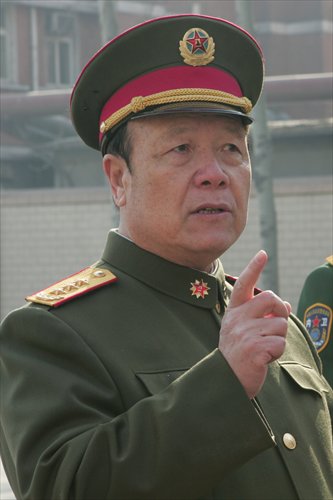HOME >> CHINA
CPC expels former general
By Global Times – Xinhua Source:Global Times Published: 2015-7-31 0:48:01
Guo Boxiong to be prosecuted for bribery

Guo Boxiong Photo: CFP
Guo Boxiong, former vice chairman of China's Central Military Commission (CMC), was expelled from the Communist Party of China (CPC) for taking bribes, according to a decision made at a meeting of the CPC Central Committee's Political Bureau on Thursday.
He is the second high-ranking military official to be placed under investigation after Xi Jinping became Party and military leader in 2012.
The investigation found that Guo took advantage of his post to seek promotion and other benefits for others and accepted bribes either personally or through his family, said the statement issued after the meeting, reported the Xinhua News Agency.
"His acts seriously violated the CPC's discipline and left a vile impact," it said.
The statement said the CPC Central Committee on April 9 decided to put Guo under investigation, according to the Party's disciplinary rules.
The meeting also decided to transfer his case regarding the "suspected serious crimes of taking bribes" and relevant clues to military prosecutors for handling in accordance with the law.
Guo, 73, was appointed vice-chairman of the CMC in November 2002 and held on to the position until late 2012.
The investigation into Guo's case has shown the Party leadership's determination to strictly manage the Party and the military, and its resolute will to crack down on corruption, the statement said. No matter what position a person holds, he will be severely punished if he violates Party rules or State laws, it added.
Speculation that Guo might also be investigated for corruption spread after Xu Caihou, another former CMC vice-chairman, was investigated for alleged bribery in March 2014.
Xu died of bladder cancer on March 15 this year and authorities decided not to pursue his case.
Guo started his career as a worker in a military factory in his home province of Shaanxi in 1958. He joined the military three years later and worked his way up the ranks.
He became deputy commander of the Beijing Military Area Command in 1993 and in 1997, commander of Lanzhou Military Area Command.
Reports said Guo was last seen in public on April 11, 2013, when he visited Shaolin Temple in Henan Province after he retired from the military.
The latest media reports that mentioned him were on February 16, when Xinhua reported that the central leadership had visited "retired comrades" ahead of the Spring Festival to deliver New Year wishes.
The investigation into Guo mirrored that of former security chief Zhou Yongkang, starting from a peripheral probe into people with close ties to him.
The military disciplinary watchdog announced an investigation into Guo Zhenggang, son of Guo Boxiong and deputy political commissar of Zhejiang provincial military command, in early March just before the opening of the annual legislative and political advisory meetings, stating that the probe started in February.
The 45-year-old military "rising star" had just been promoted to major general in mid-January.
Guo Zhenggang is one of nearly 40 senior military officials reported to be under investigation this year.
Wu Fangfang, Guo Zhenggang's wife and a businesswoman based in Hangzhou, Zhejiang Province, is likewise being investigated for fraud, news portal caijing.com reported.
Wu married Guo in December 2012, about a year after she ended her 21-year first marriage.
Wu reportedly owned an unfinished building that was supposed to house a hardware market on military-owned land in Hangzhou. During construction, Wu's company began to sell commercial space in the mall, collecting more than 500 million yuan ($80 million) from some 2,000 investors and would-be tenants. The 300,000-square-meter mall was due to be completed in 2011, but was never finished.
A series of news reports about Wu's business network as well as Guo Zhenggang's promotion path in the military were released soon after. Several military officers also said during the two sessions that more "tigers" will be caught.
The Chinese military released two lists in January and March of 30 senior military officers under investigation for corruption.
Its flagship newspaper, the People's Liberation Army Daily, has since published a number of commentaries vowing to clean up corruption in the military.
The defense ministry also recently said that the negative impact of Xu Caihou's actions must be eliminated and that people involved in his case will be punished despite his death.